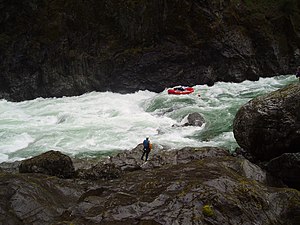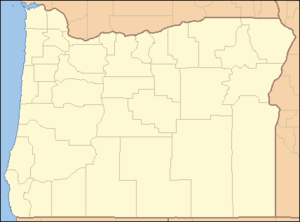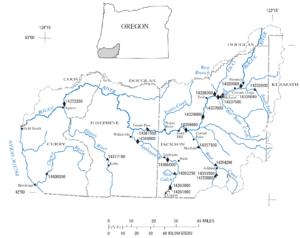Illinois River (Oregon)
| Illinois River | |
|
Rafting the Green Wall Rapids on the Illinois River
|
|
| Name origin: The U.S. state of Illinois, the birthplace of three brothers named Althouse who emigrated to Oregon and mined for gold along Althouse Creek and the Illinois River | |
| Country | United States |
|---|---|
| State | Oregon |
| County | Josephine and Curry |
| Source | Confluence of East Fork Illinois River and West Fork Illinois River |
| - location | near Cave Junction, Josephine County, Oregon |
| - elevation | 1,271 ft (387 m) |
| - coordinates | 42°09′35″N 123°39′33″W / 42.15972°N 123.65917°W |
| Mouth | Rogue River |
| - location | Agness, Curry County, Oregon |
| - elevation | 102 ft (31 m) |
| - coordinates | 42°33′00″N 124°03′58″W / 42.55000°N 124.06611°WCoordinates: 42°33′00″N 124°03′58″W / 42.55000°N 124.06611°W |
| Length | 56 mi (90 km) |
| Basin | 983 sq mi (2,546.0 km2) |
| Discharge | for near Kerby, 50.3 miles (81.0 km) from the mouth |
| - average | 1,262 cu ft/s (36 m3/s) |
| - max | 92,200 cu ft/s (2,611 m3/s) |
| - min | 121 cu ft/s (3 m3/s) |
|
Location of the mouth of the Illinois River in Oregon
|
|
|
Southwestern Oregon rivers
|
|
The Illinois River is a tributary, about 56 miles (90 km) long, of the Rogue River in the U.S. state of Oregon. It drains part of the Klamath Mountains in northern California and southwestern Oregon. The river's main stem begins at the confluence of its east and west forks near Cave Junction in southern Josephine County. Its drainage basin includes Sucker Creek, which rises in the Red Buttes Wilderness, near Whiskey Peak on the California state line. The main stem flows generally northwest in a winding course past Kerby and through the Siskiyou National Forest and Kalmiopsis Wilderness. It joins the Rogue River from the south at Agness on the Curry–Josephine county line, 27 miles (43 km) from the Pacific Ocean.
The river's lower 50.4 miles (81.1 km), from where it enters the Rogue River–Siskiyou National Forest downstream from Kerby to its confluence with the Rogue River, were designated Wild and Scenic in 1984. Of this, 28.7 miles (46.2 km) is protected as wild, 17.9 miles (28.8 km) as scenic, and 3.8 miles (6.1 km) as recreational.
Sucker Creek is named after the state of Illinois, one of whose nicknames is the Sucker State. Miners from Illinois named the creek. In 2011, the United States Forest Service worked on a project to improve the creek. The project is a fishery rehabilitation project.
...
Wikipedia



